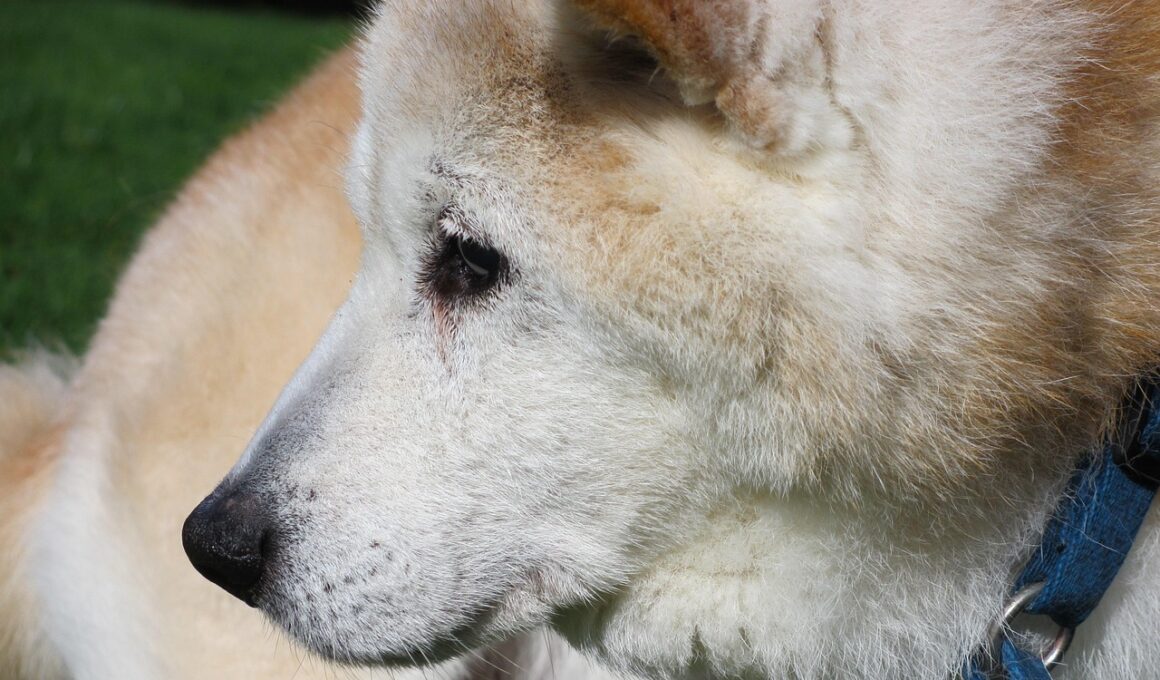How Aging Affects Your Dog’s Social Behavior
As dogs age, their social behavior can change significantly due to various factors such as health conditions and cognitive decline. Older dogs may become less interested in socializing with other dogs and humans. This shift can stem from physical discomfort, such as arthritis or specific medical conditions, which can make interactions less enjoyable. Additionally, sensory losses, particularly in hearing and vision, can contribute to a dog’s reluctance to engage socially. Older dogs might also develop anxiety, which can further impact their social interactions. Understanding these behavioral changes is crucial for owners ensuring their dog maintains an enriched social life. Providing gentle introductions to new environments or situations can help ease their anxiety. Moreover, keeping an eye on triggers that may cause stress is vital. Attention to these changes fosters a supportive environment for senior dogs and enables them to feel secure. Owners can also focus on slow-paced activities that promote social interaction in a more comforting setting. This includes low-impact games or leisurely walks around familiar areas. By adapting to these changes, caregivers can ensure their aging dogs enjoy social interactions, enhancing their quality of life.
Furthermore, the social dynamics between senior dogs and younger canines may evolve as well. Older dogs may exhibit a preference for calmer playmates or may even shy away from younger, more energetic dogs. This change is often a reflection of their declining physical capabilities rather than a lack of desire. Over time, older dogs might feel overwhelmed by the activity levels of their younger counterparts, leading to increased stress and irritation. It’s essential for pet owners to monitor these interactions closely. If your senior dog seems distressed, it may be beneficial to adjust their playgroup. Consider finding companions that match in age and energy level. Engaging senior dogs in low-key play can enhance their social network without exhausting them. Moreover, training and positive reinforcement can be used to help older dogs teach younger pups social etiquette. This process benefits both age groups, as it encourages patience and understanding. Additionally, spending time together in calm environments can foster bonds. This way, pups learn to respect the limitations of their older friends, while senior dogs enjoy positive interactions, thus maintaining their social well-being during aging.
Another critical aspect to consider is how aging impacts a dog’s cognitive abilities, specifically in terms of social cues. Many older dogs experience cognitive dysfunction syndrome (CDS), which leads to confusion and disorientation. This condition affects their ability to interpret social interactions and even their responses to familiar people and other dogs. Consequently, the behavior of older dogs during social encounters can seem erratic or defensive. Owners must learn to recognize the signs of cognitive decline, such as disorientation, changes in sleeping patterns, or anxiety in previously comfortable settings. Early detection can lead to interventions that help manage these conditions, potentially improving social behavior. Techniques such as positive reinforcement, puzzle toys to stimulate their mind, and safe socialization experiences contribute positively. Engaging with an animal behaviorist or veterinarian can guide owners through this transition. They can suggest tailored activities based on their dog’s needs. By providing stimulation and guidance, owners can help their older dogs navigate social situations more confidently. This proactive approach is essential for fostering healthy relationships, ensuring that older dogs maintain joyful social interactions and connections within their communities.
Adapting Socialization Strategies
When it comes to adapting to changes in senior dogs’ behavior, understanding their unique needs is essential. Creating a structured routine can significantly benefit older dogs, offering predictability in their social interactions. A set schedule helps older dogs feel more secure and reduces anxiety. Incorporating regular but gentle social interactions into their daily activities assists in developing their confidence. Older dogs thrive in environments where they feel comfortable, so it’s important to establish familiar spaces for socialization. Prioritize interactions with trusted friends and fellow calm dogs to ease the transition. Additionally, consider organizing short and positive social outings. Limit exposure to overwhelming situations and allow for breaks when needed. It’s crucial to observe your dog’s body language during these interactions to prevent stress. Encouraging quiet time after social outings can help them relax. Furthermore, introducing new experiences gradually can build confidence over time. This purposeful approach ensures that older dogs do not feel pressured or faced with overwhelming stimuli, thereby enhancing their overall quality of life and happiness in their golden years.
Health considerations also play a pivotal role in shaping social behavior in senior dogs. Regular veterinary check-ups are essential to monitor their overall well-being. Chronic pain or medical conditions can significantly affect how comfortably they engage with others. Owners should be vigilant about changes in behavior that could suggest an underlying health issue. For instance, if an older dog becomes more withdrawn or irritable, it may require a thorough health assessment. Adequate pain management and treatment for existing health conditions can dramatically improve their outlook on socializing. Implementing a balanced diet supportive of joint health is another factor to consider. Nutritional supplements may also assist in maintaining mobility, which is crucial for social interactions. Adequate physical activity tailored to an older dog’s ability ensures that they remain active while reducing stress. A tailored exercise regimen can significantly decrease feelings of anxiety or aggression towards younger dogs. This vigilance fosters a healthy, happy atmosphere for senior dogs. Therefore, a proactive approach to their health care promotes a positive attitude and enthusiastic spirit during social interactions.
Social Engagement Activities
To cultivate positive social behaviors in senior dogs, various engaging activities can significantly enhance their quality of life. Activities like scent games and gentle agility courses can stimulate their minds and provide joy. Such engagements allow older dogs to interact with their surroundings in stimulating ways. Interactive toys can also encourage mental engagement while reducing feelings of loneliness. Owners can create environments that support both mental and physical stimulation while incorporating socialization opportunities. Group classes specifically for senior dogs provide an excellent platform for interacting with their peers in a controlled, relaxed atmosphere. These activities promote bonding and foster friendships among canines, thereby reducing feelings of isolation. Critical to this process is ensuring the activities are not overly strenuous, accommodating their abilities and health status. State of mind directly reflects on behavior; thus, providing positive experiences during socialization can limit any behavioral issues. Involving human family members in these activities encourages a sense of community and belonging. A mix of structured and open-ended activities also enriches their social experiences, promoting confidence and enhancing their overall social skills.
Furthermore, fostering connections between senior dogs and their human companions plays a vital role in shaping positive behavioral outcomes. Older dogs thrive when supported by a consistent and dedicated human relationship. Daily interactions should focus on strengthening bonds through shared experiences, such as belly rubs or gentle walks. These activities offer reassurance and reinforce trust, making senior dogs feel secure in their human presence. Engaging in training exercises, even simple commands, can keep their minds sharp and promote cooperation. Incorporating new activities into their routine, like visiting dog-friendly cafes or participating in low-key playdates, encourages social engagement. Each interaction serves to enrich their lives while mitigating issues related to aging. Caution is necessary to ensure these experiences remain positive and stress-free. Observing the dog’s reactions will provide critical insights into what makes them feel secure and joyful. Carrying treats for rewards helps reinforce positive behavior during social interactions. Therefore, actively nurturing these human-dog relationships contributes significantly to enhancing social behaviors in older dogs while ensuring their well-being.
Ultimately, understanding and managing senior dog behavior issues is a multi-faceted task requiring attention and adaptation. Owners should proactively seek educational resources to empower themselves with knowledge. They can consult with veterinarians, trainers, or behaviorists specializing in senior dog care. Joining support groups can also be incredibly beneficial. Connecting with others discussing their experiences with aging dogs opens up avenues for shared wisdom. Engaging in workshops focused on senior dog behavior provides insights into managing issues and enhancing their quality of life. Collaboration with professionals assists in formulating tailored strategies specific to each dog’s needs. This collective knowledge helps in addressing challenges comprehensively, fostering a supportive environment for aging dogs. Positive reinforcement is often the most effective approach during this phase. Encouragement aids in modifying behavior, leading to a harmonious living situation with their human companions. Furthermore, sharing insights with other pet parents can create a unified community committed to the well-being of senior dogs. Overall, embracing the challenges posed by aging behaviors encourages love, understanding, and compassion, ensuring that these beloved pets enjoy their golden years with grace and dignity.


